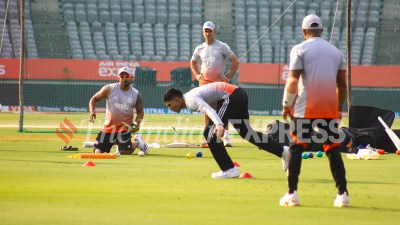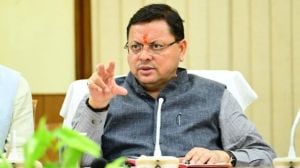Grass googly for Chinamen
CALCUTTA, March 30: The only thing more chaotic than the Calcutta traffic is, perhaps, the tennis of China's Davis Cup team, here to play...

CALCUTTA, March 30: The only thing more chaotic than the Calcutta traffic is, perhaps, the tennis of China8217;s Davis Cup team, here to play India in the Asia-Oceania Group relegation tie. It is difficult to fathom which is more twisted their names or the grasscourt game as they went through the acclimatisation process, a couple of days before the tie.
The odds are that they will be far from being acclimatised even after the tie is over. Coach He Deng-po, who also puts in a lot of effort to unravel the mysteries of the Queen8217;s language, put it rather simply, 8220;We have two grass courts. Both of them are in a hotel.8221;
8220;There in China the grass is very big,8221; the distance between his index finger and thumb increases. For somebody who is coaching a part-time team that is some understanding of the ground realites at South Club, venue of the tie.
To top it all, China have landed with a three-member team after the fourth, or is it the third, member cried off at the last minute. One of the most famous DavisCup venues may not have hosted a three-member country in a long time. You cannot blame the Chinese either. The combined Davis Cup experience of three members stands at a princely six, all gathered within the last two years, against Indonesia and New Zealand. Their top player, Pan Bing, hero of the 8217;94 Hiroshima Asiad, is also missing. Incidentally, he is one of He8217;s trainees. 8220;He is sleeping resting,8221; He said of Pan.
In Indian sporting parlance, this would be an ideal team for an exposure8217; trip. Zhu Ben-qiang is the number one player is ranked 771 with a win-loss record of 1-1, all against New Zealand. Zhang Yu, ranked 779, has more experience with a 2-2 record with both the wins coming against Indonesia in September 1998. The third member Jiang Shan has 8220;no ranking and no Cup matches8221; and seems an unlikely candidate to lead the Great March towards a Chinese tennis revolution.
The remote resemblance to the 100-year old tournament comes from captain Wang Fu-Zhang who is said to have played themaximum8217; number of ties for the country. And keeping with China8217;s obsession with secrecy, the numbers are just not available.
- 01
- 02
- 03
- 04
- 05































